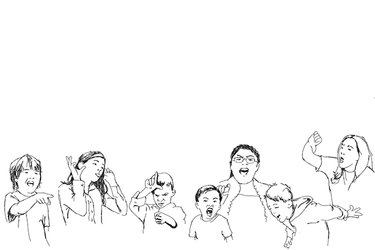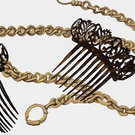Are we modeling civil discourse for the next generation?
Democracy depends on each of us — we, the people — being able to discuss matters of public concern so that knowledge is expanded and understanding is increased.
That is the meaning of civil discourse.
We attempt to engender civil discourse on these, our opinion, pages. As writers with various viewpoints share their ideas or elucidate problems, solutions can be found.
Every week, we turn away letters on national issues because our mission is to cover local news that isn’t covered elsewhere and provide a forum for discussion on local issues.
Of course we realize that the upcoming presidential election affects every one of us but there are plenty of venues covering national news where those letters can find a home as we save our fact-checking for the local issues we cover and the letters about those issues.
At the same time, though, we have in the last decade noted an erosion of civil discourse that has played out on our pages. We believe national politics has been an important part of that.
We remember a conversation we had with the late Fazana Saleem-Ismail during Donald Trump’s first presidential campaign. She believed that her children were subjected to hateful language in part because of the hateful words their classmates, perhaps repeated by their parents, had heard during the campaign.
She spoke at her library, in Guilderland, at a church in Voorheesville, and elsewhere in an attempt to educate others about her Muslim faith.
After Trump won the November 2016 election, Saleem-Ismail, working with the Capital District Coalition Against Islamophobia, hosted an Albany rally the same day as a victory rally was held by the Ku Klux Klan in North Carolina.
“When one community is targeted, we are all targeted; we are all part of humanity…There is power in numbers,” Fazana said of her reasons for organizing the rally.
“That we have a president-elect who was endorsed by a former leader of the Ku Klux Klan is frightening, and so is having white supremacists among his appointments,” Fazana told us. “We believe our strength comes from our diversity.”
The Albany rally on a blustery December day was diverse indeed. Hundreds of people — young and old, Black and white and Asian, gay and straight, Christian ministers, Jewish rabbis, Muslims, and a Quaker poet — listened as Saleem-Ismail asked at the start of the rally, “Can you feel the love?”
“Yeah!” roared the crowd in return.
“We today are building a movement … to work against forces of hate,” said Saleem-Ismail.
Sadly, Saleem-Ismail died of cancer on June 25, 2020 at the age of 47. But we believe the work she started is now more important than ever.
In the short time since President Joe Biden announced he would not seek re-election and Vice President Kamala Harris, with Biden’s endorsement, swiftly cemented the votes needed to become the Democratic candidate for president, racist and sexist slurs have abounded.
We listened to a University at Albany forum on July 26 to gain some perspective from local experts, teachers and researchers at the university.
“This is going to be an exceptionally ugly race, one of the ugliest in American history,” said Julie Nokov, who moderated the forum. “It is likely to be a very close race.”
Members of Congress have referred to Harris — whose mother came from India and whose father came from Jamaica — as a “DEI hire,” casting aspersions on her qualifications, implying instead she was filling a “diversity, equity, and inclusion” quota, and have made more outrageous remarks that we will not print here.
As a result, House Republican leaders told lawmakers to focus on criticizing Harris’s record without reference to her race and gender, Politico reported.
In a subsequent CNN interview with Jake Tapper, Nikki Haley, herself a woman of Indian descent who had challenged Trump but now endorses him, said of such racist comments, “It’s not helpful. Look, you don’t need to talk about what she looks like or what gender she is …. It doesn’t matter what she looks like. It matters what she says, what she’s fought for, and the lack of results she’s had because of it.”
We certainly endorse the idea of talking about the issues when it comes to candidates in any election.
The Enterprise puts a great deal of effort into interviewing candidates running in local school board and municipal elections on just that — their stances on the issues and what they have accomplished in that regard.
But it is unwise to ignore identity politics in our current political system. It is partly because Harris is a woman, is a person of color, is decades younger than the president that she is attracting support from women, from people of color, and from young voters.
That term, identity politics, was coined in the 1970s by Barbara Smith, a member of the Combahee River Collective, a Black feminist group.
“Black feminists and many more Black women who do not define themselves as feminists have all experienced sexual oppression as a constant factor in our day-to-day existence,” says the collective’s statement. “As children we realized that we were different from boys and that we were treated differently. For example, we were told in the same breath to be quiet both for the sake of being ‘ladylike’ and to make us less objectionable in the eyes of white people. As we grew older we became aware of the threat of physical and sexual abuse by men. However, we had no way of conceptualizing what was so apparent to us, what we knew was really happening.”
The collective’s statement goes on, “Merely naming the pejorative stereotypes attributed to Black women (e.g. mammy, matriarch, Sapphire, whore, bulldagger), let alone cataloguing the cruel, often murderous, treatment we receive, indicates how little value has been placed upon our lives during four centuries of bondage in the Western hemisphere. We realize that the only people who care enough about us to work consistently for our liberation are us.”
At the UAlbany forum, Justin Zimmerman pointed to the work of political scientist Nadia Brown, referencing Shirley Chisolm, the first Black woman elected to Congress, in 1968. “Like Chisolm, Harris has ties to the Black Greek-letter organizations, entities with long traditions of promoting civic engagement in the Black community,” he said, noting Harris is a graduate of the historically Black Howard University.
Harris being a member of the Alpha Kappa Alpha Sorority, he said “is actually a very big deal”; she is able to tap into Black political mobilization, he said.
Alpha Kappa Alpha was the first Black Greek-letter organization founded by women; it was founded at Howard in 1908 — two years after Black men founded the Alpha Phi Alpha fraternity at Cornell. These organizations were formed as Jim Crow laws were on the rise and racial prejudice and violence was widespread.
“She’s been able to raise millions of dollars just off Black folks, particularly the Black women who are the party’s organizers that want to see her become president,” said Zimmerman.
We noted this year in covering debates prior to the Democratic primaries for the 109th Assembly District and the Albany County District Attorney, both sponsored by the NAACP, the organizers, all women, who were members of Black Greek-letter sororities.
At the end of each of the debates, the women organizers spoke with poignant sincerity about the importance of democracy.
Zimmerman, a Black man who teaches courses at UAlbany in Black and urban politics, went on to say that Harris would have a “tough sell” with some Black voters because of her record as a prosecutor.
“All of those things that go into kind of the mix,” he said, “of being both proud of there being a Black woman that can finally become president, but also the system that she’s had to negotiate with in order to get to that point.”
Zimmerman suggested that, for either the Democrats or the Republicans to attract Black voters, what is needed is “a Black political agenda that puts racial justice at the forefront, economic justice at the forefront, and make sure that Black folks are actually being counted correctly.”
Professor Sally Friedman said of Harris, “If you read her autobiography, which I have actually used in class, [you see] how important her roots were to her growing up in Oakland, how important the civil rights movement was there in the late sixties, early seventies … She was really steeped in those traditions early in her life.”
None of the panelists on the UAlbany forum mentioned something that has long irked us. Male candidates are widely referred to by their last names while female candidates are often referred to by their first names, which can feel pejorative.
Bill Clinton, for example, was widely referred to as Clinton when he ran for president while Hillary Clinton was often called Hillary. Trump takes that a step further, repeatedly mispronouncing Harris’s first name.
This is a common way of making someone into an “other.” We’ve been moved over the last several years by Guilderland High School students speaking out at an annual anti-hate rally on the harmfulness of mispronounced names.
There is no good reason to purposefully perpetuate the practice.
At the UAlbany forum, Cammie Jo Bolin, whose research explores questions of identity, representation, and participation in political and religious contexts in the United States, spoke about the disadvantages women candidates face because of their gender.
“Even very young girls are socialized to think of politics as a career for men,” she said. “This gap in political interest only grows as girls and boys age through high school and then through college and even as young adults in their various professions.”
She went on, “This socialization leads to men having higher levels of political ambition … and we also know that women tend to under-evaluate their own qualifications while men don’t have the same problem. And we also know that the general public does hold women candidates to higher qualification standards. So, once you get to an election, the women who have made it that far … tend to be overqualified.”
Bolin noted, “Vice President Harris has already faced a ton of sexist and racist rhetoric … A lot of scholarship has looked at the relationship between sexism and racism and support for Trump … This is likely to be the case again in 2024.”
Bolin concluded on a positive note: “Scholars have found that, when women candidates run, it can increase interest in engagement in political discussion among young women in the electorate. It can get girls to rethink who can be a political leader and also encourage people to run for office who maybe hadn’t considered politics as a path before.”
In his concluding remarks, Zimmerman warned, “You cannot underestimate the power of racism and sexism.”
But what we can do is acknowledge, with respect, a candidate’s identity and try to understand the force of political alliances created by that identity.
This is part of civil discourse. We also must, of course, look at a candidate’s record and stance on issues important to us.
No matter the issue — local or national — no matter the election, we must use language that honors our shared humanity.


